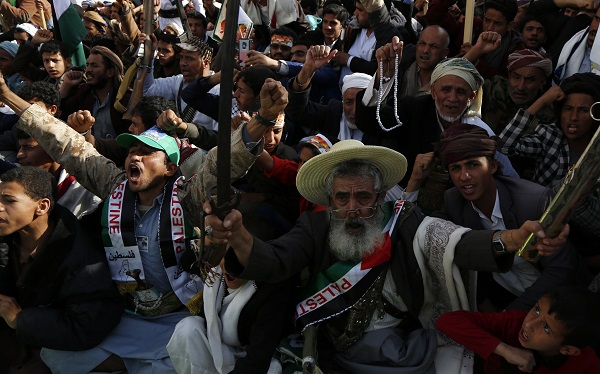
Brussels, A crisis within Yemen’s humanitarian emergency, deemed the world’s greatest, could be reaching breaking point over the control of lifesaving aid millions of Yemenis need to survive, a media report said on Tuesday.
Major donors and some of the world’s biggest aid agencies will meet in Brussels on Thursday in an effort to forge a collective response to what is being widely described as unprecedented and unacceptable obstruction by Houthi authorities who hold sway over large swathes of northern Yemen, the BBC said in the report.
A recent UN Security Council briefing on the war-torn country underlined that access constraints were affecting 6.7 million Yemenis who needed assistance – a figure which it noted has “never been so high”.
“Humanitarian agencies must operate in an environment where they can uphold humanitarian principles,” the BBC quoted Lise Grande, the UN’s Resident Humanitarian Coordinator in Yemen, as saying on Monday.
“If we reach a point where the operating environment doesn’t allow us to do that, we do everything we can to change it.”
Months of meetings, a succession of envoys despatched to the capital Sanaa, and a series of statements to the UN Security Council have failed to resolve a catalogue of complaints ranging from delays in permits to harassment and detention of staff.
Concerns spiked when a levy on every aid agency was proposed, amounting to 2 per cent of operational budgets, by the body established to exert greater control over aid known as the Supreme Council for the Management and Coordination of Humanitarian Affairs (SCMCHA).
This report comes after 24 patients were evacuated from Yemen to Jordan on February 8 on a UN-chartered plane, the second flight of a medical air bridge from the closed airport in Sanaa.
The World Health Organization had launched the medical air bridge operation last week with the first flight carrying seven patients to the Jordanian capital.
The air bridge of ‘mercy flights’ was initially due to be launched in October, but negotiations with the countries involved, including Saudi Arabia, caused delays.
Sanaa is under the control of Houthis, an Iran-aligned rebel group opposed to the internationally recognized government of Abdu-Rabeh Mansour Hadi. The airspace is in the hands of the pro-Hadi Arab coalition and has remained closed to civilian aircraft since 2016.
Houthi health authorities say that around 32,000 patients need to be airlifted via Sanaa airport for medical treatment abroad.
Fighting broke out in late 2014 when Houthi rebels, backed by Iran, occupied Sanaa and other provinces in the country and dissolved the government.
The battle intensified in 2015 with the intervention of the Arab-led coalition made up of Sunni countries in favour of forces loyal to President Abdo Rabu Mansur Hadi, who is internationally recognized and currently in exile in Riyadh.
Over 24 million Yemenis, around 80 per cent of the war-torn country’s population, are in desperate need of humanitarian aid due to the conflict, according to UN reports.









